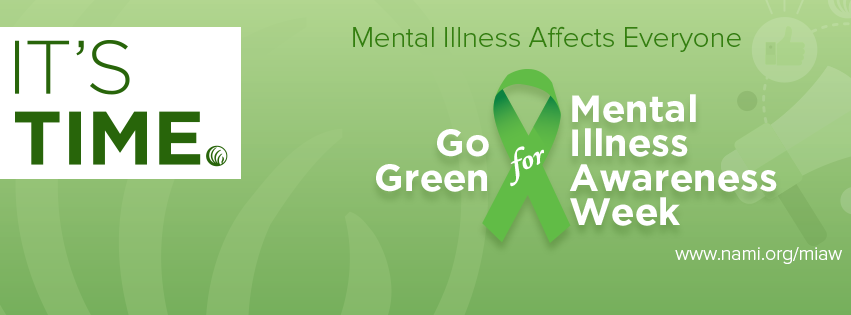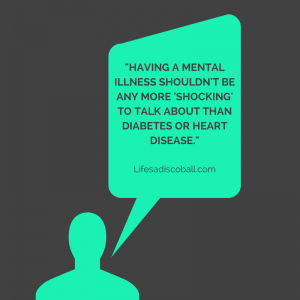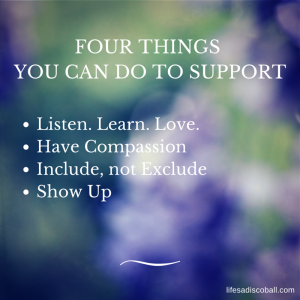This week is Mental Illness Awareness Week. If you’re new to reading this blog, you may not be aware of the passion I have around this cause. My son, now 12, was first diagnosed with a mental illness at the age of 5, ADHD. In subsequent years, he was also diagnosed with many other mental illnesses. The most prevalent being Mood Disorder NOS, GAD (Generalized Anxiety Disorder, and ODD (Oppositional Defiant Disorder). Our journey has not been an easy one. But then, this seems to state the obvious, because I don’t know of any mental illness journey that is an ‘easy one’.
What I want you to know about privacy and why I share what I do…
I’ve been questioned, criticized and received sideways glances for sharing the story of what it is like to parent a son with mental illness. Many have questioned my place in sharing it, since it is his story. But it is mine too. Parenting a child with mental illness can be lonely and heart breaking, but also enlightening and beautiful. I understand people questioning how sharing his story could impact him. I ask myself these questions too. Does it break his trust and invade his privacy? Does it cross a line that shouldn’t be crossed? If the answer is yes, then I don’t write it. I ask his permission to share things. We discuss the importance and value of being open about his diagnoses. But I also respect when he’s not comfortable or when I feel it shouldn’t be shared.
I share A LOT. And so it seems that perhaps I share everything. But I don’t. There is much more to our story that doesn’t get shared, because it isn’t appropriate or right. Because it would be crossing a line and invading privacy. I am diligent in always checking myself, in always remembering that I am not just telling my story, but often, I am telling his too.
But I also don’t believe in being quiet about this illness. I don’t believe it serves any greater purpose to be silent. Because being silent perpetuates the stigma and shame associated with mental illness. And this. must. STOP.
Eliminating the three S’s: Shame, Stigma and Silence
Shame. Stigma. Silence. These three. They cycle perpetually. Over and over again. It really doesn’t matter which of them comes first. You could argue that first comes the shame around mental illness, thus the stigma, and then people are silent. Or, you could say that people are silent, because they’re shameful and this begets the stigma. Really, the order doesn’t matter. But what does matter? All three must be abolished, wiped out, eliminated as the status quo, when it comes to mental health issues. Allowing these three to continue, keeps many from getting the help they need and causes many people to feel more alone than they already are, living with this illness.
Having a mental illness shouldn’t be any more ‘shocking’ to talk about than diabetes or heart disease.
Yet, it is.
Shock, disbelief and discomfort. A common response when I tell someone my son lives with mental illness. I take medications for cardiomyopathy and high blood pressure. My son takes medications for a mood disorder and ADHD. No one questions me as to why I take a beta blocker, but many question the use of the medications I give my son. They are quick to judge and tell me their point of view on his meds, but no one ever…ever questions mine. Why is it okay for me to mention my medications without judgement from others, but to mention his prescriptions for mental illness? Well, suddenly his illness is questioned. In disbelief, they say, “But he looks sooo normal”.Â
Do you think when I tell someone I was diagnosed with heart disease ten years ago, they respond with, “But, YOU look soooo normal…” No. Of course they don’t. So why, for the love, is it okay to question my son’s illness, his medications, and judge how ‘normal’ he looks? WHY?
It is an invisible disease. Even I (and it breaks my heart to admit this) have uttered the words, “Yes, you’d never know…” in responding to someone’s disbelief about my son’s mental illness. I know better now. And in the moment, I guess it was my way of trying to identify with the person I was talking to. But seriously…all that does is perpetuate stigma and disbelief that this illness can impact anyone. And it can.
This illness can impact ANYONE.
So let’s not make it worse by insisting we stay quiet about an illness that is more common than diabetes. According to the CDC, 29.1 million Americans live with diabetes.* And according to NAMI, 61.5 million Americans experience mental illness in a given year.** Yet, we must hush, be quiet, and not talk about it. Are you kidding me? Here’s the thing. I’m not saying if you have diabetes, or heart disease or mental illness, that you MUST talk about it. But I AM saying, that we, as a society, must not shame people who do. We must listen. We must care. We must support.
I think we could agree that in most cases, a person who speaks up and shares they live with diabetes or heart disease is not shamed, humiliated or judged. Yet, this happens daily to people living with mental illness. Again, why? What are we afraid of? Did you know that the 61.5 million Americans experiencing mental illness in a year breaks down to 1 in 4 adults? Think about that.
1 in 4. Â That’s an astonishing amount of people living quietly and alone, afraid to speak up.
THIS MUST CHANGE.
The Impact of Mental Illness on America:
- Serious mental illness costs America $193.2 billion in lost earnings per year.
- Mood disorders such as depression are the third most common cause of hospitalization in the U.S. for both youth and adults ages 18 to 44.
- Individuals living with serious mental illness face an increased risk of having chronic medical conditions.
- Adults living with serious mental illness die on average 25 years earlier than other Americans, largely due to treatable medical conditions.
- Over 50 percent of students with a mental health condition age 14 and older who are served by special education drop out−the highest dropout rate of any disability group.
- Suicide is the tenth leading cause of death in the U.S. (more common than homicide) and the third leading cause of death for ages 15 to 24 years. More than 90 percent of those who die by suicide had one or more mental disorders.
- Although military members comprise less than 1 percent of the U.S. population, veterans represent 20 percent of suicides nationally. Each day, about 22 veterans die from suicide.**
Can you read these facts and continue to ignore the mental health crisis that is taking place here? If we eliminate the stigma and shame around mental illness by REFUSING TO BE SILENT about it, we could impact EVERY SINGLE ONE of those bullet points above. Every. Single. One.
Four Things You Can Do to Support Someone Living with Mental Illness
Many people ask me this question. What can I do to help? How can I support the mental health cause?
- Listen. Learn. Love. Listen to those who live with mental illness. Learn about it. And Love them. Remember the person living with mental illness is not their illness. They have it, but it is not all of who they are. No more than my cardiomyopathy or high blood pressure is only a part of who I am.
- Have Compassion. We must practice compassion. It isn’t easy. We are a culture that judges first, whether it is our place to or not. I ask you to practice showing up with compassion first. How would you want to be treated if you were going through something similar? Be empathetic. Show kindness. Have respect.
- Include, not exclude. Most of the time, we don’t mean to be mean or unkind. I think in most cases, we exclude, instead of include, when we feel uncomfortable or uncertain. What will we say? How do we act? What will they be like? Remember that 1 in 4 people live with mental illness. This means everyday, you are likely interacting with people who have experienced mental illness at some point in their life. You just don’t know it. Did you treat those people differently when you didn’t know? No, of course you didn’t.
- Show Up. Many times, having a mental illness leaves you feeling more alone. Even by those who love you most. Because people don’t know what to say or do when they show up, so often, they just don’t. Show up anyway. Even if you don’t know what to say. The best thing you could probably say is just that, “I don’t know what to say, but I am here for you. What can I do, how can I help?” ***
Lastly, if you are living with mental illness and feel alone, you are not. There is help out there, support, education and resources. You don’t have to do this alone. Contact one of these organizations to learn more:
http://www.suicidepreventionlifeline.org
http://www.nimh.nih.gov/index.shtml
http://www.who.int/mental_health/en/
* http://www.cdc.gov/diabetes/pubs/estimates14.htm
**Â http://www.nami.org/factsheets/mentalillness_factsheet.pdf
***Â http://www.mentalhealth.gov/talk/friends-family-members/index.html



 Follow
Follow

You’re doing important work here, and so is your son. Thanks for having the courage and the strength to share your stories.
Thank you Sarah. You know how passionate I am about this topic. I’m thankful we have the opportunity to make something positive out of our challenging journey.
This has been an ongoing conversation in my home this past year as our 23 year old son has been fighting a tough battle with anxiety, panic attacks and severe depression. I am not ashamed to talk about it and love that you are openly discussing it as well. Sharing is how we learn from each other and support each other. I’m certain that for all the people who share negative comments or opinions with you there are just as many who are grateful because hearing your story lets them know they are not alone. Thank you!
Thank you Daidri! It is so important for those of us on this journey to not feel alone. I do get many positive comments from others, both those that have been living in silence and also from those who are appreciative of me sharing our story so they can learn. Hopefully, the more of us that speak out, the stigma will decrease and less will suffer in silence. Thank YOU for sharing your story too. And thank you for reading and commenting. Hugs to you!